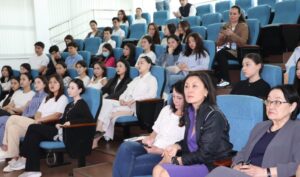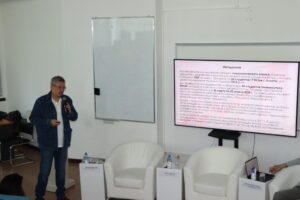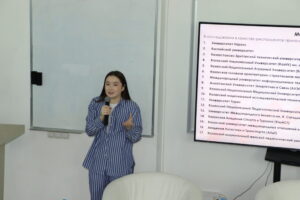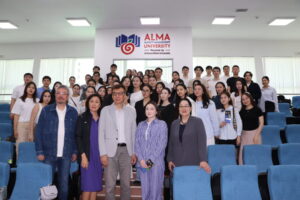Almaty, May 15, 2024 – The National Association “Densaulyk” and Almaty Management University (AlmaU) presented the results of a study on the attitude to a healthy lifestyle of Almaty students.

A similar study was conducted in 2017. In this study, in addition to analyzing the results for 2024, an analysis of changes in the habits and behavior of respondents 7 years after the first study was conducted. Students from 17 universities of Almaty participated in the study as respondents. The project’s field events were held from March 20 to April 20, 2024.

The method of sociological survey was used as a tool. Within the framework of the method, a questionnaire was developed for the target group – students of Almaty universities, both living at home and living in dormitories and rented apartments. The study used data from 1,013 respondents, 57% of respondents aged 18-19 years, 30% from 19 to 20 years, and 13% aged over 20 years. 48% of the respondents were men, 52% were women.

“This is a joint study conducted by the Densaulyk Association and Almaty Management University, within the framework of the discipline “Service to Society”. 87 students of the 1st year of AlmaU were involved in the work on the study as volunteer interviewers. During their volunteer internship, students have shown themselves to be responsible and disciplined individuals with an active civic position, endowed with a heightened sense of justice and ready to implement innovative ideas. I would especially like to note their interest in social issues and creative approach to their duties. As practice shows, students with experience in volunteering are more successful in getting a job. Combining training and volunteering provides favorable conditions for professional self–realization,” said Gulnara Asemkulova, Professor of Practice at AlmaU, School of Transformative Humanities.
Eating fast food
85% of the respondents regularly consume fast food. In the 2017 study, 74% of respondents regularly consumed fast food (an increase of more than 10%).
Of this number, about 23% consume fast food regularly, that is, once or more once a day. In the 2017 study, this figure was 32%.
At the same time, only 10% of respondents consume fast food because of its cheapness (18% in 2017), and about 27% because of time savings (24% in 2017). The majority of respondents, 63%, consume fast food because they consider it tasty and fashionable (58% in 2017). It is significant that the number of students who considered fast food cheap in 2017 decreased from 18% to 10%, while the number of respondents who consider fast food tasty and fashionable increased slightly by 5%.

Consumption of Sweet Carbonated Drinks
More than 83% of respondents admitted to consuming sweet carbonated drinks, energy drinks, and nectars with high sugar content (70% in 2017). Approximately 54% consume these drinks regularly – one or more times a day (51% in 2017).
Alcohol Consumption
23% of students consume alcohol (32% in 2017). Among them, about 8% consume alcohol daily (also 8% in 2017), while approximately 8% drink several times a week (14% in 2017), and about 10% once a week (12% in 2017). Around 13% drink alcohol several times a month (28% in 2017), and 61% drink once a month or less (38% in 2017).
“Thus, we can state an overall decrease in both the number of students consuming alcohol and the frequency of alcohol consumption. However, these figures are still quite high, considering the legal prohibition on the sale and consumption of alcohol by those under 21 years of age. Even with the apparent decrease in alcohol consumption, the percentage of respondents who consume alcohol weekly or more often is about 26%. In 2017, this figure was 34%,” noted Danila Bekturganov, a sociologist and director of the Public Fund “Civil Expertise.”
The expert also pointed out that 25% of the alcohol consumed by students consists of medium-strength non-carbonated drinks (40% in 2017), about 40% are low-alcohol carbonated drinks (27% in 2017), and strong drinks account for about 23% of consumption (20% in 2017). Thus, the consumption of medium-strength non-carbonated drinks such as wines and vermouths has decreased, while the consumption of low-alcohol carbonated drinks like beer, alcoholic cocktails, and energy drinks has increased.
Smoking (Nicotine Use)
About one-third of the surveyed students, or 32%, smoke or use nicotine (34% in 2017). The vast majority, over 80%, smoke regularly – one or more times a day (55% in 2017).
39% of respondents smoke traditional cigarettes (56% in 2017). There has been a significant decrease in the number of those using hookahs, down to 11% (38% in 2017), and snus to 5% (20% in 2017). 60% of respondents use electronic cigarettes (42% in 2017).
“Despite the clear change in nicotine-containing product consumption towards the use of electronic cigarettes, the figures for smoking respondents are concerning. The ban on the use of hookahs and snus was already in place in 2017, and a noticeable decrease in the number of respondents using snus and hookahs is evident. However, the ban has not led to a complete cessation of hookah and snus use. Moreover, despite the increase in excise taxes on tobacco products and more than a twofold increase in prices – the minimum price for a pack of cigarettes was 340 tenge in April 2017 and 770 tenge in April 2024 – the percentage of students using tobacco products has remained virtually unchanged at 32-34%. The regularity of smoking has also increased, with the number of respondents who smoke regularly rising from 55% in 2017 to 82% in 2024. The introduced ban on the sale of cigarettes and sticks to individuals under 21 has not yielded positive dynamics either. It is clear that the bans on the sale of cigarettes, the use of hookahs, and the sale of snus have not produced the results expected by the authorities; it can be assumed that the recently declared ban on vapes will not bring the desired results either,” noted Gintautas-Yoza Kentra, a doctor and deputy chairman of the NGO “National Health Association.”
Sports Participation
A significant portion of students, 32%, lead a sedentary lifestyle. This figure has not changed over the past seven years. About one-third of students engage in sports. Changes in data reflecting attitudes towards sports participation have been minimal over the past seven years.
Awareness of Health Status
63% of surveyed students do not have objective information about their health status and do not undergo regular medical examinations. At the same time, compared to 2017, the percentage of students undergoing medical check-ups has increased from 31% to 37%.
